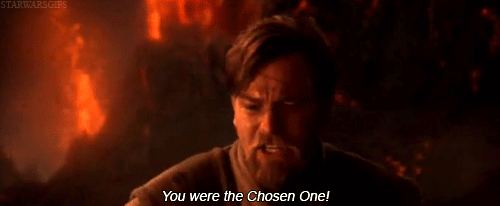Hopefully you remember Neo. He was a big deal in the early 2000s, with the extreme popularity of the Matrix series, and by that, I mean extreme popularity of the first matrix movie, and then the middling popularity of the second movie, and then the massive unpopularity of the third movie.
The plot of the movie revolves around Neo, and the name 'Neo' is a very clever anagram. I'll let you run it through an online anagram solver before I tell you the answer. The answer, of course, is One. As in, Neo is the one. This is a theme that runs through a number of films, stories, radio dramas, all that, the idea that there is a one chosen hero who is foretold, who will come to save the people from their existential angst and temporal troubles. A, dare I say it, Messiah, who will come.
Now, if you know your Old Testament, you will know that there are a lot of references to the Messiah, to the Lord's anointed, the one who will come to save Israel, not just for a time as though he were Judas Maccabeus, but for eternity. There are a lot of prophecies about the Messiah who would sit on the throne of his father David, and of his kingdom there would be no end. This is a wonderful prophecy, one that all the people of Israel certainly wanted to be fulfilled, but there is always a question about that, which is 'are you the one?'
You have to ask this question very carefully, and listen very carefully for the answer, for even Jesus tells you that many will come appearing as false Messiahs, and he has been proven to be right, as he always is, by the sheer number of people claiming to be the Messiah from Israel and beyond. With all these people claiming to be THE Messiah, people had the healthy question, asking 'are you the one?' You could ask each of these Messiahs this question, asking them one at a time if they are the one or not, and finding out what the answer would be. Because if you are going to have faith in the Messiah, if you're going to follow the Messiah wherever he leads, if you're going to ascribe to the Lord the glory due his name, and if there is one and only one, you're going to want to make really sure that the one you're following is the one.
Do you know that John the Baptist had this exact same line of questioning? He certainly did, and for good reason. Unlike you or I who can shake our heads and cluck our thick tongues and think so very delicately on the subject of which church to join, that kind of thing, John the Baptist was in jail. He had been locked up in jail because he spoke truth to power, and had the gall to mention to Herod that his relationship wasn't on the up and up. And while John was in jail, while he was behind bars, he sought word about Jesus of Nazareth. If you're going to be behind bars, if you're going to be stashed away, far from polite company, imprisoned by the powerful who want you and your morality to be obliterated, you're going to want some words of assurance that the one you're following is the one. And when the disciples of John come to Jesus, Jesus tells them to tell John what they had seen:
Luke 7:22-23 22So he replied to the messengers, "Go back and report to John what you have seen and heard: The blind receive sight, the lame walk, those who have leprosy are cleansed, the deaf hear, the dead are raised, and the good news is proclaimed to the poor. 23Blessed is anyone who does not stumble on account of me."
Jesus shows his majesty through what he does, not just what he says. The work that he does is phenomenally important, given the ability for him to do what he does. But it goes one step further, because the work of Christ is important not just for what it is, but for what it says. Think for a second about that popular Christmas carol 'Joy to the world.' Think most especially about the third verse:
No more let sins and sorrows grow,
Nor thorns infest the ground;
He comes to make his blessings flow
Far as the curse is found.
There was a curse placed on humans in the garden, once they had fallen from Grace. They had sinned, and through their sin, death, disease, illness, blindness, deafness, all those things entered into the world. You know, everything that the people who came to Jesus were suffering from. All the things that were signs and evidence of the curse of sin: illness, scarcity, injury, sinfulness itself, and death itself, are all things that Jesus comes to solve. And when Jesus exhibits his power, he shows himself as being God with us. He shows himself as the Messiah, the only one who can undo the curse that had plagued us. He is the one whom the wind and waves obey. He is the one who absolutely unpicks all the stitches, who untangles the barbed wire, who shows that for the first time since the fall God and man are on the same side. This is shown most firmly and concretely at the cross, when Jesus dies, and the temple curtain is torn in two. At that moment, the visible barrier between God and man was removed, at the death of Christ. But that curtain was just a visible marker of the spiritual separation between us and God.
That barrier is gone now. And now, eternally, God is with us .
No more let sins and sorrows grow,
Nor thorns infest the ground;
He comes to make his blessings flow
Far as the curse is found.
There was a curse placed on humans in the garden, once they had fallen from Grace. They had sinned, and through their sin, death, disease, illness, blindness, deafness, all those things entered into the world. You know, everything that the people who came to Jesus were suffering from. All the things that were signs and evidence of the curse of sin: illness, scarcity, injury, sinfulness itself, and death itself, are all things that Jesus comes to solve. And when Jesus exhibits his power, he shows himself as being God with us. He shows himself as the Messiah, the only one who can undo the curse that had plagued us. He is the one whom the wind and waves obey. He is the one who absolutely unpicks all the stitches, who untangles the barbed wire, who shows that for the first time since the fall God and man are on the same side. This is shown most firmly and concretely at the cross, when Jesus dies, and the temple curtain is torn in two. At that moment, the visible barrier between God and man was removed, at the death of Christ. But that curtain was just a visible marker of the spiritual separation between us and God.
That barrier is gone now. And now, eternally, God is with us .


